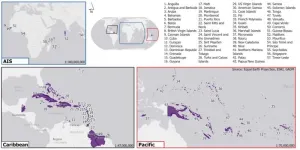(Press-News.org) Changes in the make-up of the gut microbiome are linked to the onset of clinically evident rheumatoid arthritis in those at risk of the disease because of genetic, environmental, or immunological factors, suggests research published online in the Annals of the Rheumatic Diseases.
It’s not clear if this instability is a cause or consequence of disease development, emphasise the researchers, but the findings might nevertheless help to identify those at risk as well as paving the way for preventive and personalised treatment strategies, they suggest.
Previously published research consistently shows an unfavourable imbalance in the gut microbiomes of those at risk as well as those diagnosed with rheumatoid arthritis compared with the gut microbiomes of those without the disease. But it’s not clear exactly which microbes might be involved.
To explore this further, the researchers tracked changes in the gut microbiome profiles of 124 people at risk of developing rheumatoid arthritis; in 7 newly diagnosed people; and in 22 healthy people over a period of 15 months, by assessing their stool and blood samples at 5 different time points.
Those at risk were identified by the presence of precursor anticyclic citrullinated protein (anti-CCP) antibodies, which attack healthy cells and are specific for rheumatoid arthritis, and by experience of joint pain in the preceding 3 months.
Weekly dietary intake was similar among all three groups, although alcohol intake and the amount of regular moderate to vigorous exercise taken differed.
During the study period, 30 of the 124 in the at risk group progressed to rheumatoid arthritis, and their microbial diversity was notably reduced compared with that of the healthy comparison group, particularly within specific areas—known as alpha diversity.
Alpha diversity was also reduced in both those who progressed and those who didn’t, and linked to anti-CCP antibody levels. In those with low anti-CCP antibody levels microbial diversity was comparable with that of the healthy comparison group.
Recognised genetic, blood, and imaging risk factors for arthritis development were also significantly linked to lower microbial diversity, as was steroid use.
A specific strain of Prevotellaceae sp—(ASV2058) most likely P copri—was abundant in the microbiomes of those who progressed as well as in those of the newly diagnosed, but not in the microbiomes of those in the healthy comparison group.
Another strain (ASV1867) of P copri was also increased at the start of the study in those who progressed, possibly suggesting that different strains of P copri might have different roles in rheumatoid arthritis progression, say the researchers.
Further analysis indicated that both enrichment (three) and depletion (five) of Prevotellaceae-specific strains were associated with progression.
While P copri strains were most strongly associated with clinical risk factors for rheumatoid arthritis, other Prevotellaceae strains were also implicated, including Alloprevotella, Paraprevotella clara, Prevotella stercorea, Prevotellamassilia timonensis and Prevotella shahii.
The greatest instability in gut microbiome profile was seen among those who developed arthritis up to 10 months before diagnosis. But this profile was relatively stable in those diagnosed after this time—10-15 months before the development of rheumatoid arthritis. This suggests that changes in the gut microbiome are a late stage phenomenon, say the researchers.
This is an observational study, precluding any firm conclusions to be drawn about causal factors. And the researchers acknowledge various study limitations, including the small number of participants, the relatively short monitoring period, and the lack of direct one on one comparison between the at-risk and healthy participants.
But they conclude: "Individuals at risk of [rheumatoid arthritis] harbour a distinctive gut microbial composition, including but not limited to an overabundance of Prevotellaceae species. This microbial signature is consistent and correlates with traditional risk factors.
“Longitudinal examination shows a dynamic microbial environment preceding [rheumatoid arthritis] onset. Further research into this late phase of disease development is merited, especially given the potential of the gut microbiome as a target for prevention, including in high-risk individuals with imminent arthritis.”
END
Gut microbiome changes linked to onset of clinically evident rheumatoid arthritis
But it’s not clear if this ‘instability’ helps prompt or follows disease development. Findings might nevertheless help to identify those most at risk and personalise treatment
2024-11-08
ELSE PRESS RELEASES FROM THIS DATE:
Signals from the gut could transform rheumatoid arthritis treatment
2024-11-08
Changes in the gut microbiome before rheumatoid arthritis is developed could provide a window of opportunity for preventative treatments, new research suggests.
Bacteria associated with inflammation is found in the gut in higher amounts roughly ten months before patients develop clinical rheumatoid arthritis, a longitudinal study by Leeds researchers has found.
Affecting more than half a million people in the UK, rheumatoid arthritis is a chronic disease that causes swelling, pain and stiffness in the ...
Pioneering research reveals some of the world’s least polluting populations are at much greater risk of flooding fuelled by climate change
2024-11-08
A new study has exposed for the first time how inhabitants of the smallest countries globally, contributing least to climate change, already bear the brunt of its devastating consequences and the burden is likely to worsen.
The research, led by the University of Bristol, showed on average nearly one in five people (20%) in Small Island Developing States (SIDS) – totalling some 8.5million – are now exposed to coastal and inland flooding. For three of the 57 countries concentrated in the Pacific, Caribbean, Indian Ocean, ...
UK’s health data should be recognized as critical national infrastructure, says independent review
2024-11-08
An independent review, Uniting the UK’s Health Data: A Huge Opportunity for Society, published today (8 November 2024), has found that complexities and inefficiencies are impeding the use of the UK’s rich sources of health data to improve people’s health and lives. Researchers and analysts frequently have to wait many months – or even years – to securely access health data to improve care and for vital research into diseases like dementia, cancer and heart disease.
Led by Professor ...
A 36-gene predictive score of anti-cancer drug resistance anticipates cancer therapy outcomes
2024-11-07
BIRMINGHAM, Ala. – In 1937, President Franklin Roosevelt signed the National Cancer Act, launching a nationwide effort to combat the disease. Eighty-seven years later, despite significant progress, cancer treatment often falls short, with 50 to 80 percent of patients not responding to treatment and more than 600,000 cancer deaths annually in the United States.
What if clinicians could predict the success of any cancer treatment, ensuring each patient receives the most effective care?
The challenge lies in the diverse nature of the disease. There are hundreds of different types of cancers, characterized by the specific type of cell from which they originate. Even patients ...
Someone flirts with your spouse. Does that make your partner appear more attractive?
2024-11-07
Picture this: You’re at a bar when someone starts hitting shamelessly on your spouse or significant other, who doesn’t flirt back. As the scene unfolds, your base instincts kick in—annoyance, anger, jealousy—followed by a heightened sexual desire for your partner. You’re ready to reclaim the attention that should be rightfully yours, correct?
Not necessarily, according to a new study in the Journal of Sex Research by researchers at Reichman University in Herzliya, Israel, and ...
Hourglass-shaped stent could ease severe chest pain from microvascular disease
2024-11-07
ROCHESTER, Minn. — A study at Mayo Clinic suggests that an hourglass-shaped stent could improve blood flow and ease severe and reoccurring chest pain in people with microvascular disease. Of 30 participants in a phase 2 clinical trial, 76% saw improvement in their day-to-day life. For example, some participants who reported not being able to walk around the block or up a flight of stairs without chest pain were able to do these ordinary physical activities at the end of a 120-day period. Clinical measures of blood flow related to the microvasculature of the heart significantly improved during ...
United Nations ratifies framework to protect people on cash app
2024-11-07
As mobile-money services were growing at a rapid clip in the developing world 10 years ago, University of Florida computer scientists and cybersecurity experts Kevin Butler and Patrick Traynor were early sentinels, raising concerns about the lack of security that could lead to real problems for the user.
In a 2014 study, the two professors from UF’s Department of Computer and Information Science and Engineering, uncovered security vulnerabilities of mobile cash apps, especially in the Global South, where such technologies were becoming essential in the absence of robust banking systems.
“Our early work uncovered ...
Oklahoma State basketball team joins the Nation of Lifesavers
2024-11-07
http://newsroom.heart.org/news/oklahoma-state-basketball-team-joins-the-nation-of-lifesavers?preview=8409af5e5a5f3127f6aec7e122cc9673STILLWATER, Okla., October 28, 2024 — The Oklahoma State University (OSU) men’s basketball team participated in an American Heart Association Hands-Only CPR (cardiopulmonary resuscitation) training to learn the correct rate and depth of CPR compressions to be confident and capable when faced with a cardiac emergency. Learning Hands-Only CPR is the skill needed to join the Association’s Nation of Lifesavers™ movement, which is focused on doubling survival rates ...
Power of aesthetic species on social media boosts wildlife conservation efforts, say experts
2024-11-07
Facebook and Instagram can boost wildlife conservation efforts through public awareness and engagement, according to a study published in the peer-reviewed journal Environmental Communication.
The findings based on the caracal – a wild cat native to Africa with distinctive tufted ears – demonstrate how social media can harness support for the predators, which some farmers shoot and poison.
Results show that the mammal’s similarity to a domestic feline has attracted thousands of followers to internet feeds about caracal conservation. ...
Researchers develop robotic sensory cilia that monitor internal biomarkers to detect and assess airway diseases
2024-11-07
Xiaoguang Dong, assistant professor of mechanical engineering, is leading a team of researchers that has developed a system of artificial cilia capable of monitoring mucus conditions in human airways to better detect infection, airway obstruction, or the severity of diseases like Cystic Fibrosis (CF), Chronic Obstructive Pulmonary Diseases (COPD) and lung cancer.
The research was published in the November 4 issue of PNAS in the article, “Sensory Artificial Cilia for In Situ Monitoring of Airway Physiological Properties.”
In their paper, the researchers noted that continuously ...
LAST 30 PRESS RELEASES:
Massage Therapy Foundation awards $300,000 research grant to the University of Denver
Gastrointestinal toxicity linked to targeted cancer therapies in the United States
Countdown to the Bial Award in Biomedicine 2025
Blood marker from dementia research could help track aging across the animal world
Birds change altitude to survive epic journeys across deserts and seas
Here's why you need a backup for the map on your phone
ACS Central Science | Researchers from Insilico Medicine and Lilly publish foundational vision for fully autonomous “Prompt-to-Drug” pharmaceutical R&D
Increasing the number of coronary interventions in patients with acute myocardial infarction does not appear to reduce death rates
Tackling uplift resistance in tall infrastructures sustainably
Novel wireless origami-inspired smart cushioning device for safer logistics
Hidden genetic mismatch, which triples the risk of a life-threatening immune attack after cord blood transplantation
Physical function is a crucial predictor of survival after heart failure
Striking genomic architecture discovered in embryonic reproductive cells before they start developing into sperm and eggs
Screening improves early detection of colorectal cancer
New data on spontaneous coronary artery dissection (SCAD) – a common cause of heart attacks in younger women
How root growth is stimulated by nitrate: Researchers decipher signalling chain
Scientists reveal our best- and worst-case scenarios for a warming Antarctica
Cleaner fish show intelligence typical of mammals
AABNet and partners launch landmark guide on the conservation of African livestock genetic resources and sustainable breeding strategies
Produce hydrogen and oxygen simultaneously from a single atom! Achieve carbon neutrality with an 'All-in-one' single-atom water electrolysis catalyst
Sleep loss linked to higher atrial fibrillation risk in working-age adults
Visible light-driven deracemization of α-aryl ketones synergistically catalyzed by thiophenols and chiral phosphoric acid
Most AI bots lack basic safety disclosures, study finds
How competitive gaming on discord fosters social connections
CU Anschutz School of Medicine receives best ranking in NIH funding in 20 years
Mayo Clinic opens patient information office in Cayman Islands
Phonon lasers unlock ultrabroadband acoustic frequency combs
Babies with an increased likelihood of autism may struggle to settle into deep, restorative sleep, according to a new study from the University of East Anglia.
National Reactor Innovation Center opens Molten Salt Thermophysical Examination Capability at INL
International Progressive MS Alliance awards €6.9 million to three studies researching therapies to address common symptoms of progressive MS
[Press-News.org] Gut microbiome changes linked to onset of clinically evident rheumatoid arthritisBut it’s not clear if this ‘instability’ helps prompt or follows disease development. Findings might nevertheless help to identify those most at risk and personalise treatment



